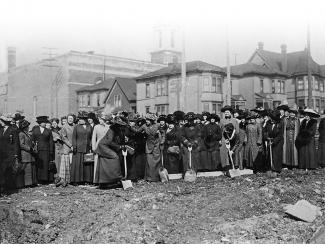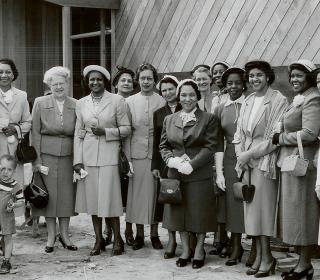YWCA’s Formation
YWCA Seattle | King | Snohomish (originally called Seattle Young Women’s Christian Association) was founded in 1894 by a group of women, led by Rees Daniels. The purpose of the organization at the time was to provide services for women in need looking to establish self-support and stability, a guiding principle that would shape the organization’s mission for years to come. Initially, YWCA opened with a lounge and cafeteria offering 10-cent lunches for working women.
From its early history, YWCA organized multi-interest, multi-cultural clubs to for young women and girls in the area. There were clubs for high school girls, young married women, factory workers, domestic workers, and office workers. As the region’s community grew and diversified, clubs were made available for African-American women (the Culture Club) and women of Japanese, Chinese, and Russian descent.
In the early 1910s, YWCA launched a fundraising drive and raised $400,000 to help build a new location at 5th Avenue and Seneca in downtown Seattle. Built in 1914, the eight-story brick building remains our headquarters today.
YWCA started offering career training in 1914 following the enactment of a landmark $10 per week minimum wage for women. The Vocational Training Department held classes in millinery, dressmaking, cafeteria work, tearoom management, practical nursing, manicuring and salesmanship. YWCA developed strong relations with the business community, arranging job placements and promoting better conditions for women in the workplace.
As the severity of homelessness and poverty has increased over the years, and as a commitment to ending racism was centered in the organization’s mission, the scope of programs offered has grown to include not only housing and job training but also health services, domestic violence advocacy, and financial literacy.
YWCA's presence in Snohomish County started as World for Women, an organization founded in 1976 in Edmonds to provide emergency shelter and housing, counseling and services, job readiness classes, and support groups for women and families. The name was changed to Pathways for Women in the mid 1980s, and was merged with YWCA of Seattle-King County (as our organization was know at the time) in 1995 to make YWCA Seattle | King | Snohomish.
YWCA is the largest and oldest nonprofit focused on the needs of women in the region. Our organization operates more than 25 locations across two counties. Our 900 units of housing and almost 40 programs help over 7,000 women, men, and children each year overcome obstacles created by racism and sexism, and build stable and self-sufficient futures.
A journey to empowering women, eliminating racism
In 1919, the Culture Club established its own branch in the heart of Seattle’s Central District, an area densely populated with African-American residents due to the city’s redlining practices. Despite YWCA’s long-held inclusive philosophy, African-American women could not rent a hotel room in the downtown building.
The new Phyllis Wheatley Branch (named for the famous black poet of the Revolutionary War era) was the first of its kind in the Northwest, providing social, educational, and employment programs to 150 African-American members. The branch provided lodging and became a popular venue for weddings, dances for young people, and meetings of community women’s organizations.
From the start, the Phyllis Wheatley Branch sent a non-voting representative downtown to YWCA board meetings. As the new representative in the 1930s, Bertha Pitts Campbell protested, saying that if she was expected to attend meetings, she wanted to vote. The board requested a change in policy from the national association, which granted its approval, giving Seattle the distinction of having the first racially integrated YWCA board in the nation.
Additionally, African-American community members were restricted to swimming in YWCA’s pool only on Saturday afternoons – a deliberately chosen time before the pool was drained and cleaned. Racially segregated pools were common at this time, and continued to be into the 1960s. In instances, like at YWCA’s pool, where black community members were allowed to use the pool, it usually coincided with the cleaning schedule, motivated by the racist belief that black people were less hygienic than whites.
Championing social justice
Throughout the turbulent 1960s and 1970s, YWCA championed social justice and equal rights. The Board of Directors went on record in support of President Johnson’s war on poverty and sent telegrams to lawmakers urging immediate passage of civil rights legislation “as a first step in eliminating poverty and racism in the U.S.A.” YWCA sponsored public forums on equal rights and civil liberties, housing, and health programs for low-income groups.
Understanding that the only way to eliminate racism and empower women was to address the root causes of injustice, YWCA continues to advocate at the city, county, state, and federal level. As YWCA began to acquire and build additional permanent housing units for low-income women and families in the 1980s and 90s, the organization committed to fair housing practices that reject discrimination based on race and other factors.
For the next two decades, YWCA opened regional service centers in Renton and Everett, Opportunity Place in downtown Seattle, YWCA Family Village in Redmond, and Greenbridge Learning Center in White Center. Each new facility reflected the growing needs of the community and the shift in the diversity of the region. Culturally appropriate employment, counseling and family services were offered including programs to support girls of color as the next generation of successful women leaders.
Our history is one to be proud of, but also one to continue to examine for the disparities in the treatment of our members and the stories we tell.

